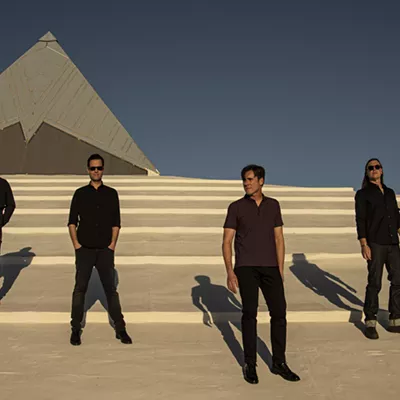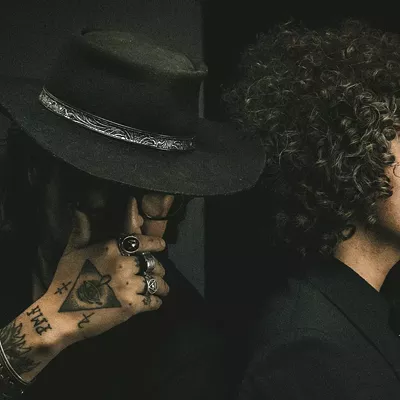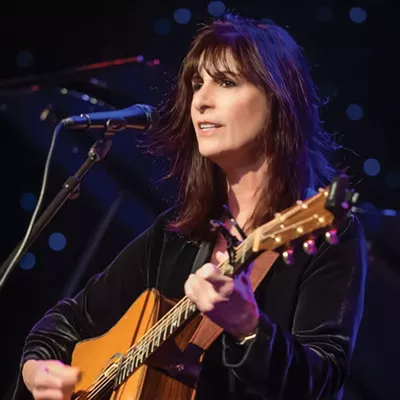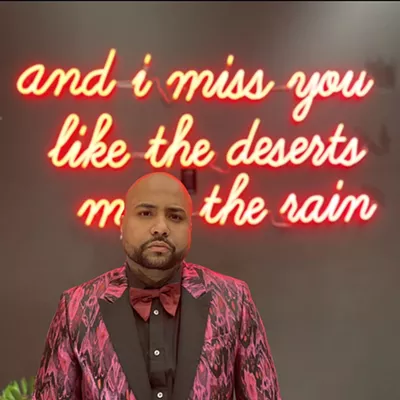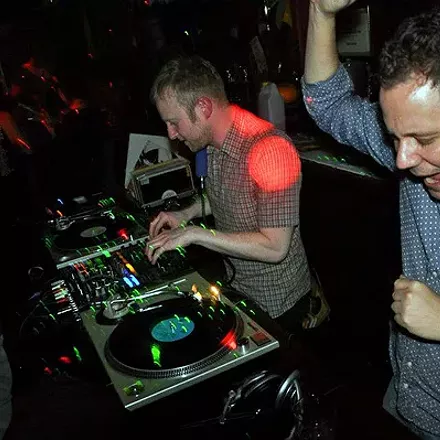Maryott, 46, has sung jazz, blues, rock, country, folk and experimental music, primarily in her hometown of Tucson, with a few extended sabbaticals in Alaska and Greece. She remembers her first performance, at 6 years old, singing "Oh Susanna" and accompanying herself on autoharp in a school concert. She is a visual artist and has performed in experimental dance and theater productions.
Born in Philadelphia, 49-year-old Clipman started playing his father's Radio King Slingerland drum kit when he was 3 years old.
"The vibration went right through me and rearranged my molecular structure," he says.
He arrived in Tucson in 1977, and he boasts a musical background as diverse as Maryott's, having played all manner of percussion instruments in straight-ahead jazz, folk and rock 'n' roll bands, and with everyone from blues guitarist Rainer Ptacek to Native American flutist R. Carlos Nakai. He is also a teacher, poet and visual artist.
Both veterans of the Tucson music community, Clipman and Maryott found themselves thrown together once in a while for one-off gigs backing up mutual friends--most notably with Orts Theatre of Dance and Howe Gelb's all-star honky-tonk Band of Blacky Ranchette.
And although everything in these performers' professional and personal lives led up to their collaboration, neither was prepared for the intense emotions born of making Listen With Your Heart, which they released independently and on their own dime.
The 11 challenging avant-garde compositions for voice and percussion on the recording are unlike anything you have heard, although elements it may remind listeners of many cultural traditions in music, including those of Native American, Asian, African, Latin American, Australian Aboriginal and Indian origin.
Maryott applies her incredible range to wordless melodies both visceral and haunting, while Clipman plays rhythm instruments from every continent except Antarctica--from balafon to berimbau, from doumbek to djembe. Their music is a combination of the familiar and the unfamiliar, designed to chart a course through the unknown but to draw on the experiences of the listener.
Clipman and Maryott know their music might be superficially labeled, for lack of a better category, as part of the genre known as New Age. Although inclined to squirm away from that pigeonhole, they have toyed with phrases such as "sonic synergy," "somatic synesthesia" and "new world music" to describe their unique sound.
Lately, Maryott prefers simply the term "avant-garde," which can be translated from the French to mean "fore-guard" or, loosely, the leading edge of a movement whether it be an army, music, art or literature.
Certainly, the tracks on Listen With Your Heart are far from the placid harmonies and unthreatening contemporary-instrumental noodling of what is often termed New Age.
"It's not easy listening," Maryott says at Clipman's westside home, where they have met for an interview. "There's no gray area in terms of responses from listeners."
Clipman says, "People who 'get it' really seem to love it, and people who don't get it just don't like it at all. But I find it to be a very balanced experience. It has light and dark, male and female, all that."
He's right, you can hear it: sweet and bitter, fear and comfort, love and anger, cold and hot, contraction and release--all the dichotomies that shape whole humans.
The project grew out of Maryott's experimental "chanteling," a term she coined to describe the act of creating vocal harmonies within unique acoustic spaces to "channel the chant." After a lunch together, the pair decided to meld chanteling with various rhythm instruments.
The results of that first collaboration have "evolved into a highly intuitive and improvisational dialogue between the human voice in all its instrumental breadth and depth, and the drum in all its nonverbal communicative capability," according to the album's liner notes.
"Maryott sang and I just played whatever percussion instrument I laid my hands on," says the drummer.
After initial experimentations were recorded on Maryott's mini-disc player, Clipman and Maryott decamped to the Sedona-based Wisdom Tree Studios of stringed-instrument master and luthier William Eaton, with whom Clipman has long played and recorded.
The recording experience was remarkable, Maryott says. "I was singing in an 8-foot glass octagon, and I could see William Eaton through one pane of glass, and Will through the other, and behind me was the natural environment."
"All the bed tracks we recorded live together," Clipman says.
"Then we multi-tracked and overdubbed later," Maryott adds.
"Not a lot, though," he counters. "Just some extra percussion and vocal harmonies and stuff."
Initial recording took a year, start to finish, and then the duo sat on the demos for a few months before legendary sound engineer Jack Miller, of the Phoenix-based Canyon Records, agreed to mix the album.
"He is one of the old masters; he cut his teeth with RCA in the 1950s and '60s. He's recorded everybody from Henry Mancini to the Rolling Stones, from orchestras to one guy with a flute," Clipman says.
For Maryott, Listen With Your Heart is largely about healing. A retired massage therapist, she spent 20 years encountering the mechanics and metaphysics of the human body and the last six or so studying how sound affects the body.
"Shamans always have used chanting as medicine, or a medium for healing. There are a huge amount of people doing scientific research in sound and its effects on the physical body."
But Maryott sings only 11 words (four of them are the title) on the entire recording. Most of her vocalizations are wordless, using the voice purely as an instrument of sound no different than a trumpet or piano.
She says she wanted not only to free the music from what a friend calls the "politics of language," but for the recording "to be an offering up to people's imaginations."
Clipman has always considered rhythm a human language more primary, and primal, than spoken words. And the combination of voice and drum is part of human ancestry.
"The human voice is the oldest instrument," he says, "and right behind that is percussion, hitting one thing with another. Percussion and voice give you all the elements of all music--rhythm, melody and harmony."

